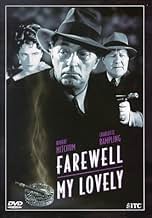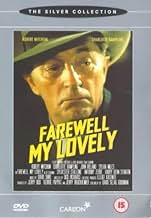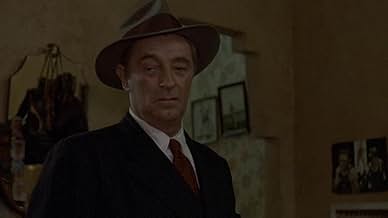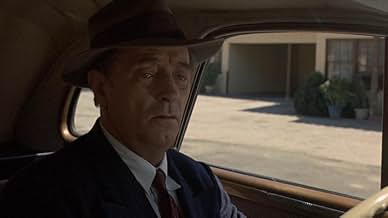Los Angeles private eye Philip Marlowe is hired by paroled convict Moose Malloy to find his girlfriend Velma, former seedy nightclub dancer.Los Angeles private eye Philip Marlowe is hired by paroled convict Moose Malloy to find his girlfriend Velma, former seedy nightclub dancer.Los Angeles private eye Philip Marlowe is hired by paroled convict Moose Malloy to find his girlfriend Velma, former seedy nightclub dancer.
- Director
- Writers
- Stars
- Nominated for 1 Oscar
- 1 win & 3 nominations total
Jimmy Archer
- Georgie
- (as Jimmie Archer)
- Director
- Writers
- All cast & crew
- Production, box office & more at IMDbPro
Featured reviews
This re-make of Raymond Chandler's work has the edge on the 1944 film. Robert Mitchum's face fits the film perfectly. His ageing hard boiled-looking features look like a relief map of the Rocky Mountains! In this movie Mitchum was as good he has ever been. He got better as he got older. What I also liked was the haunting but soulful musical score, at the beginning and at the end.
In the closing scene an atmosphere of rising crisis that seems to hang in the air; created by the soulful musical score. Marlow with the case all wrapped up and himself at a loose end; in the amusement centre playing the machines, picks up a discarded newspaper with "Tokyo" in bold print as the front page headline. Was this the late hours of the 6th of December in Los Angeles? A sailor and his girl, and a soldier in the background makes it seem so. Both the sailor and the soldier, and the whole of America blissfully unaware, that a Japanese armada has shaped a easterly course
across the North Pacific. That scene coupled with the soulful musical score is like a forlorn-sounding and doom-laden overture to what is about to happen with surprising and devastating suddenness on the following but quiet Sunday morning in Hawaii. It is not surprising that one of the songs is titled, "Sunday".
In the closing scene an atmosphere of rising crisis that seems to hang in the air; created by the soulful musical score. Marlow with the case all wrapped up and himself at a loose end; in the amusement centre playing the machines, picks up a discarded newspaper with "Tokyo" in bold print as the front page headline. Was this the late hours of the 6th of December in Los Angeles? A sailor and his girl, and a soldier in the background makes it seem so. Both the sailor and the soldier, and the whole of America blissfully unaware, that a Japanese armada has shaped a easterly course
across the North Pacific. That scene coupled with the soulful musical score is like a forlorn-sounding and doom-laden overture to what is about to happen with surprising and devastating suddenness on the following but quiet Sunday morning in Hawaii. It is not surprising that one of the songs is titled, "Sunday".
The work of Raymond Chandler experienced a resurgence in the 1970s, thanks to Robert Altman's 'The Long Goodbye (1973)' and Roman Polanski's very Chandler-ish 'Chinatown (1974).' The waning career of Robert Mitchum was also revived by two Chandler adaptations, 'Farewell, My Lovely (1975)' {previously filmed by Edward Dmytryk as 'Murder, My Sweet (1944)'} and 'The Big Sleep (1978) {previously filmed by Howard Hawks}. Though outside the traditionally-accepted film noir period (approx. 1940-1958), the 1970s provided an ideal climate for a resurgence of the style. The demise of the Production Code in the 1960s had allowed filmmakers the freedom to explore more explicit themes, usually implying an increase in language, violence and nudity. Chandler's novels – which typically dabbled in themes of prostitution, homosexuality and pornography – could now be adapted faithfully without the threat of censorship, though fortunately, in the case of this particular film, director Dick Richards doesn't overdo the sleaze. The source material is one of the few Marlowe novels I haven't read, but 'Farewell, My Lovely' nevertheless seems a loyal interpretation of the author's style.
Philip Marlowe is the sort of role that Robert Mitchum would have nailed in the 1950s, when he always seemed to feel old and weary without actually looking it. Nevertheless – though he lacks the cocky vigour of Dick Powell, or the invincibility of Humphrey Bogart – the aging Mitchum does communicate what is perhaps Marlowe's most defining characteristic: that of a disillusioned, world-weary private dick looking for something in this world, anything, worth fighting for. In his latest case, Marlowe is hired by fearless lug Moose Malloy (Jack O'Halloran) to find his girlfriend Velma, who vanished while Malloy was serving a prison sentence. As always, what had initially seemed a straightforward assignment soon gets Marlowe embroiled in a complex patchwork of deceits, murders and double-crossings. Crucial to the mystery is Charlotte Rampling (emulating Lauren Bacall) as the adulterous wife of an old millionaire, and Oscar-nominated Sylvia Myles as an alcoholic performance artist. Also look out for small roles from Harry Dean Stanton as Det. Rolfe, and Sylvester Stallone as a lustful thug.
'Farewell, My Lovely' does a fine job of translating Chandler's pessimistic vision of urban decay and human depravity. The 1940s adaptations are, of course, superbly entertaining, but most of them – particularly 'The Big Sleep (1946)' and 'Lady in the Lake (1947)' – are clearly filmed on a pristine studio set, somewhat offsetting the grittiness of Chandler's characters and plot. Richards' film, to his credit, is incredibly ugly. Aside from Helen Grayle, whose sprawling mansion suffers next to Buckingham Palace, most of Marlowe's witnesses live in appalling squalor; even his own office is drab and bathed in shadow. Yet, despite the unpolished milieu, 'Farewell, My Lovely' most assuredly has a heart. Marlowe's wordless interactions with the son of a penniless musician help us see beneath the detective's front of indifference, hinting at his admiration for the honest working-class, and his fervent distaste towards the decadence of the wealthy. When offered his own wealth, Marlowe unthinkingly surrenders it to someone he deems more worthy, a touching but cheerless ending to a film steeped in the unpleasantness of human existence.
Philip Marlowe is the sort of role that Robert Mitchum would have nailed in the 1950s, when he always seemed to feel old and weary without actually looking it. Nevertheless – though he lacks the cocky vigour of Dick Powell, or the invincibility of Humphrey Bogart – the aging Mitchum does communicate what is perhaps Marlowe's most defining characteristic: that of a disillusioned, world-weary private dick looking for something in this world, anything, worth fighting for. In his latest case, Marlowe is hired by fearless lug Moose Malloy (Jack O'Halloran) to find his girlfriend Velma, who vanished while Malloy was serving a prison sentence. As always, what had initially seemed a straightforward assignment soon gets Marlowe embroiled in a complex patchwork of deceits, murders and double-crossings. Crucial to the mystery is Charlotte Rampling (emulating Lauren Bacall) as the adulterous wife of an old millionaire, and Oscar-nominated Sylvia Myles as an alcoholic performance artist. Also look out for small roles from Harry Dean Stanton as Det. Rolfe, and Sylvester Stallone as a lustful thug.
'Farewell, My Lovely' does a fine job of translating Chandler's pessimistic vision of urban decay and human depravity. The 1940s adaptations are, of course, superbly entertaining, but most of them – particularly 'The Big Sleep (1946)' and 'Lady in the Lake (1947)' – are clearly filmed on a pristine studio set, somewhat offsetting the grittiness of Chandler's characters and plot. Richards' film, to his credit, is incredibly ugly. Aside from Helen Grayle, whose sprawling mansion suffers next to Buckingham Palace, most of Marlowe's witnesses live in appalling squalor; even his own office is drab and bathed in shadow. Yet, despite the unpolished milieu, 'Farewell, My Lovely' most assuredly has a heart. Marlowe's wordless interactions with the son of a penniless musician help us see beneath the detective's front of indifference, hinting at his admiration for the honest working-class, and his fervent distaste towards the decadence of the wealthy. When offered his own wealth, Marlowe unthinkingly surrenders it to someone he deems more worthy, a touching but cheerless ending to a film steeped in the unpleasantness of human existence.
The choice of Mitchum for the lead role really did work. The novel suggest a tired Marlowe, who has had enough of being "detective to the stars". He wants to get out of his seedy little life, and change things, but instead, he gets wrapped up in another case. Mitchum's hang dog expression and tired wise guy act sums up the depression of the fallen hero. This is not the smooth talking Bogart, not the finely clipped and smooth Powell, but a harder, more experienced Marlowe, a man more aware of his own downfall. As he says to knulty, what he need is a nights sleep, what he needs is another drink. After watching this truly excellent recreation of late forties LA, I'm not sure that I couldn't agree with him.
Ah yes, and Charlotte Rampling and the sometime Thelma really was "cuter than lace pants"
Ah yes, and Charlotte Rampling and the sometime Thelma really was "cuter than lace pants"
Stylish remake of the much-filmed Chandler classic. Was Mitchum too old for the rolethat was the rap at the time. In hindsight, I don't think so, especially when he has that persuasive moment about aging near film's end. He certainly looks like he's climbed too many stairs and closed too many bars, but then that creates an unusual amount of pathos that deepens the role. Still and all, the passionate clinches with a sleek young Charlotte Rampling are borderline at best.
This is one of the few successful neo-noirs in my little book. Director Dick Richards and crew manage a funky look just right for the hard-boiled atmosphere of 40's detective fiction. Marlowe (Mitchum) drifts from one seedy venue to the next in his search for the mysterious Velma. But true to Chandler's slice-of-life LA, there's also a glimpse of the high- and-mighty in a Beverly Hills palace worthy of royalty. In fact, Marlowe resembles something of a pilgrim loner navigating greater LA in search of an elusive truth even after he's forgotten why.
Mitchum, of course, lowkeys all the way, hardly changing expression whether being roughed up by Moose Malloy or nuzzling up to Helen Grayle (Rampling). It has to be one of the more downbeat performances in private eye annals. But my Oscar goes to Sylvia Miles as the ultimate blowzy drunk (Florian). Her house is a mess, her hair is a mess, and her robe never quite fits in revealing ways Marlowe refuses to pick up on. Still and all, a fling with her looks more promising than an interlude with that plastic mannequin Marlowe does cozy up with. At the same time, Jack O'Halloran as the Moose comes across as the kind of pitiable dumb ox who would sacrifice everything for a faithless woman. In fact, the movie boils down oddly to something of a Samson and Delilah update.
But not everything is upside. The dialogue occasionally gets a little too cute, while the DiMaggio running thread seems forced at times. Nonetheless, it's a worthy version of the popular novel, and I'm just sorry that director Dick Richards hasn't been more active in the production end of the business. Judging from this film and the under-rated Culpepper Cattle Company, he certainly has the talent. And when an expressionless Marlowe comes to part with his money at movie's end, we finally glimpse that remote inner terrain and the heart of Chandler's heartless world.
This is one of the few successful neo-noirs in my little book. Director Dick Richards and crew manage a funky look just right for the hard-boiled atmosphere of 40's detective fiction. Marlowe (Mitchum) drifts from one seedy venue to the next in his search for the mysterious Velma. But true to Chandler's slice-of-life LA, there's also a glimpse of the high- and-mighty in a Beverly Hills palace worthy of royalty. In fact, Marlowe resembles something of a pilgrim loner navigating greater LA in search of an elusive truth even after he's forgotten why.
Mitchum, of course, lowkeys all the way, hardly changing expression whether being roughed up by Moose Malloy or nuzzling up to Helen Grayle (Rampling). It has to be one of the more downbeat performances in private eye annals. But my Oscar goes to Sylvia Miles as the ultimate blowzy drunk (Florian). Her house is a mess, her hair is a mess, and her robe never quite fits in revealing ways Marlowe refuses to pick up on. Still and all, a fling with her looks more promising than an interlude with that plastic mannequin Marlowe does cozy up with. At the same time, Jack O'Halloran as the Moose comes across as the kind of pitiable dumb ox who would sacrifice everything for a faithless woman. In fact, the movie boils down oddly to something of a Samson and Delilah update.
But not everything is upside. The dialogue occasionally gets a little too cute, while the DiMaggio running thread seems forced at times. Nonetheless, it's a worthy version of the popular novel, and I'm just sorry that director Dick Richards hasn't been more active in the production end of the business. Judging from this film and the under-rated Culpepper Cattle Company, he certainly has the talent. And when an expressionless Marlowe comes to part with his money at movie's end, we finally glimpse that remote inner terrain and the heart of Chandler's heartless world.
L.A. of June 1941 as it was depicted in the Raymond Chandler's novel of the same title is filled with the dark secrets of the past that better stay uncovered. Philip Marlow, PE (Robert Mitcum) takes a job to find a vanished girlfriend of the felon Moose Malloy, and he has no idea what will follow. As Marlow searches for Velma Galento, he has to deal with a beautiful but cold and calculating seductress (Charlotte Rampling - young, sensual and dangerous), a jealous corrupt detective (Stanton), an old alcoholic girlfriend (Sylvia Miles in one of her two Oscar nominated performances, second - the shortest in the history of Oscars, for "Midnight Cowboy"), and a buffed thug (Sylvester Stallone -- it was fun to see him before he became a star of Rocky and Rambo).
This adaptation of Raymond Chandler novel features action, suspense, humor, mystery and Robert Mitchum in one of his best performances as a man struggling with cynicism, hatred, and betrayal.
This adaptation of Raymond Chandler novel features action, suspense, humor, mystery and Robert Mitchum in one of his best performances as a man struggling with cynicism, hatred, and betrayal.
Did you know
- TriviaIn the novel, Philip Marlowe was in his 30s. Robert Mitchum, who plays him in this film, was 57.
- GoofsWhen Marlowe (Robert Mitchum) drives up to Mrs. Grayle's home (Charlotte Rampling), the front entrance is obviously double doors but when the butler is shown opening it from the inside, it is clearly a single door.
- Quotes
Philip Marlowe: [voiceover] The house itself wasn't much. It was smaller than Buckingham Palace and probably had fewer windows than the Chrysler building.
- ConnectionsFeatured in Proini peripolos (1987)
- SoundtracksI've Heard That Song Before
Words and Music by Jule Styne and Sammy Cahn
Sung in the dance hall at the opening.
- How long is Farewell, My Lovely?Powered by Alexa
Details
Box office
- Budget
- $2,500,000 (estimated)
Contribute to this page
Suggest an edit or add missing content



































